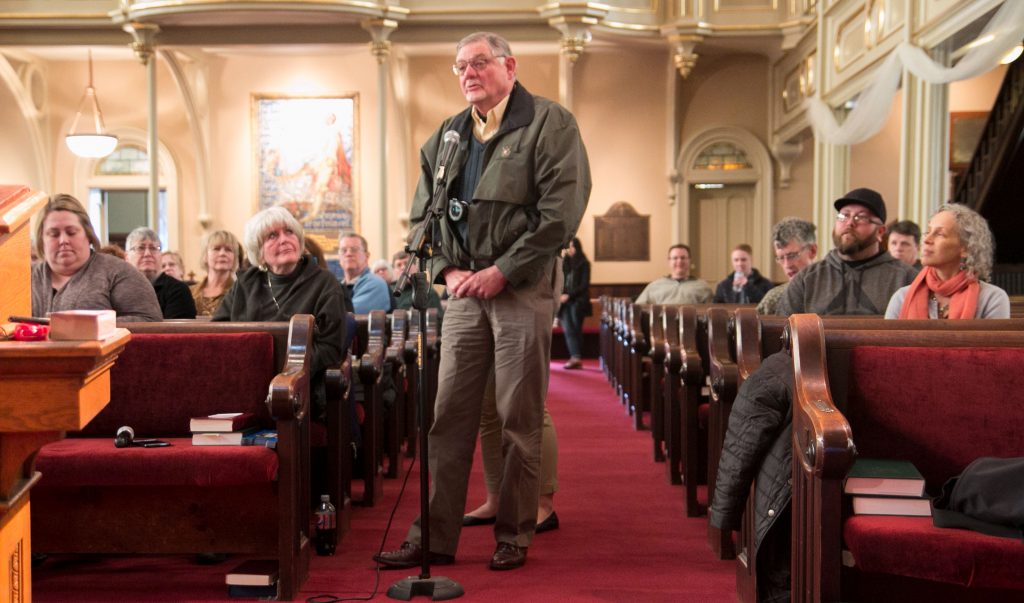
Two weeks ago, 2,000 community members took to the streets of Downtown Binghamton, joining the national March for Our Lives movement. On Saturday, inside the United Presbyterian Church of Binghamton on Chenango Street, a much smaller group of activists gathered with the same goals.
On the altar sat three local representatives: State Assemblywoman Donna Lupardo, Broome County Executive Jason Garnar and Bob Weslar, Broome County legislator for the 13th District, which includes parts of the First Ward and West Side.
Each representative emphasized the need for adequate mental health resources in schools and communities while they addressed the crowd at the beginning of the meeting. Garnar pointed to the Broome County Promise Zone, which offers mentoring and counseling to young people, and the employment of caseworkers from the Department of Social Services in the Binghamton City School District since last year as effective tools.
“It can’t be just about safety, per se, in terms of the law enforcement aspect — it’s also got to be about mental health,” Garnar said.
During the conversation, Lupardo mentioned New York’s passage of the Secure Ammunition and Firearms Enforcement Act of 2013, which bans all assault weapons except those purchased before January 2013, in response to the 2012 massacre in Sandy Hook. New York is one of seven states, plus the District of Columbia, that have bans on assault weapons.
Although these guns can’t be legally sold or bought, they can be found at some venues when events like gun shows take place. Additionally, assault weapons can be legally purchased in Pennsylvania, which borders Broome County. The state line is just south of Binghamton — less than 10 miles away. Lupardo said more universal regulations must be enacted by national leaders.
“Our hope is that this movement galvanized change at [the] federal level,” Lupardo said. “We need our representatives to step up and have a real, robust conversation at the national level.”
To the politicians’ left was an empty straight-backed chair, labeled with a sign bearing Congresswoman Claudia Tenney’s name. Tenney’s absence was noted at several points throughout the town hall. Community members asked questions addressed to her, and mentioned the amount of money she received from the National Rifle Association in the 2016 election cycle, $5,950.
Three days prior to the town hall, the Broome County chapter of the High School Democrats of America (HSDA) held a press conference in which it called on Tenney to attend the discussion.
“We want a public and open dialogue between Rep. Tenney and her constituents,” said Benjamin Reynolds, president of the Broome County HSDA and a senior at Johnson City High School. “It’s a representative’s obligation to hear from her constituents and we don’t feel like she’s been doing a very good job.”
A spokeswoman answering the phone at Tenney’s office on Wednesday said the congresswoman didn’t have plans to be in the district on Saturday. State Sen. Fred Akshar, Binghamton Mayor Rich David and Anthony Brindisi, a state assemblyman running to replace Tenney in the 22nd Congressional District, were also invited to attend the discussion, but couldn’t because of prior commitments.
Some attendees voiced concerns that safety measures like increasing the ranks of school resource officers could foster a more dangerous environment for students of color. A federal report published by the Government Accountability Office last month found that black students accounted for roughly 39 percent of all suspensions, despite making up just 15.5 percent of the overall student body in the school districts studied.
“What young people of color fear isn’t necessarily a mass shooting at a school,” said Bobby Black, a 25-year-old Binghamton area resident. “But one of our greatest fears is violence from the state. If we’re going to talk about gun violence, then we have to talk about all of it. Not just mass shootings, not just random acts of violence, but violence from gun-holding members of the state as well.”
In response, Garnar proposed more thorough training of police officers and increased efforts to diversify police departments throughout Broome County. Nevertheless, Black said politicians need to work to find alternate solutions besides changing demographics.
The attendees were noticeably older and less diverse than those of last month’s March for Our Lives.
“Last month, there were 2,000 people at the march,” said John Patterson, 68, a Binghamton area resident. “What do we have today ― 50? You have to keep the pressure up. I wish there were more young people here.”


